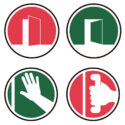
Be creative in the way you manage boring tasks, says Carole Spiers
Unfortunately, we all sometimes have to deal with boring, routine tasks. Those are the days when the clock ticks by so slowly you can see the hands move.
We all know that we get stressed when there is too much to do, but do we appreciate the ‘rust out’ factor (i.e., when there is insufficient work to keep our attention)? It can be equally stressful. In such situations, we psych ourselves up to start to work in the morning, but our energy levels may stay low all day. Then, when we stop working, we can be tired and listless because we have received little stimulus during the day.
If you do have a boring job, try and be creative in the way that you manage it. Think ‘outside the box’ in the way that you do things, and you may be able to make your job different and more stimulating.
Here are my 10 top tips to avoid getting bored:
- Try to rotate certain aspects of your work so that you speak to different people in different departments on different days, all of which can stimulate conversations about home, family life and interests.
- Set yourself realistic goals. If your goals are unattainable, then you are setting yourself up to fail, and you certainly don’t want to do that. So set yourself goals that will stretch your mind but are achievable.
- Take your breaks during the day and plan what you will do with them. When it’s time for your lunch break, think in advance as to what you are going to do and use this time to recharge your batteries.
- Book a virtual lunch conversation with a colleague. You might earn something new, and you may even find yourself a new friend.
- Chunk your time into two-hour blocks. Give yourself set periods to complete a task and when it is complete, assess what you have done and how pleased you are with the result. You may or may not get praise from someone else, so you will need to give yourself a positive ‘pat on the back’ to see you through.
- Repetitive tasks can cause boredom because they demand minimal attention while providing little brain stimulation. But try and follow the work through to the end so that you have the satisfaction of seeing the finished task or product.
- Research a new technique or skillset that might be helpful for you. You may be thinking about delivering presentations, and if this is the case, you may wish to start making inquiries into which organisation can help you.
- Additional stimulation can help with boredom. Listening to music (for example) can help to maintain alertness. However, the additional stimulation mustn’t compete with the attention required to complete the task.
- Stop the clock countdown! Staring at the clock won’t make time go any quicker and it might slow it down. Stop staring at your phone and watch to check the time. Focus on what it is that you are doing and take pride in your work.
- Make a ‘to read’ folder in your inbox, and when you get bored, give yourself 10 minutes of break time away from your desk so that you can read something a little bit different.
At the end of the day, try to not let your boredom affect your performance and productivity.













